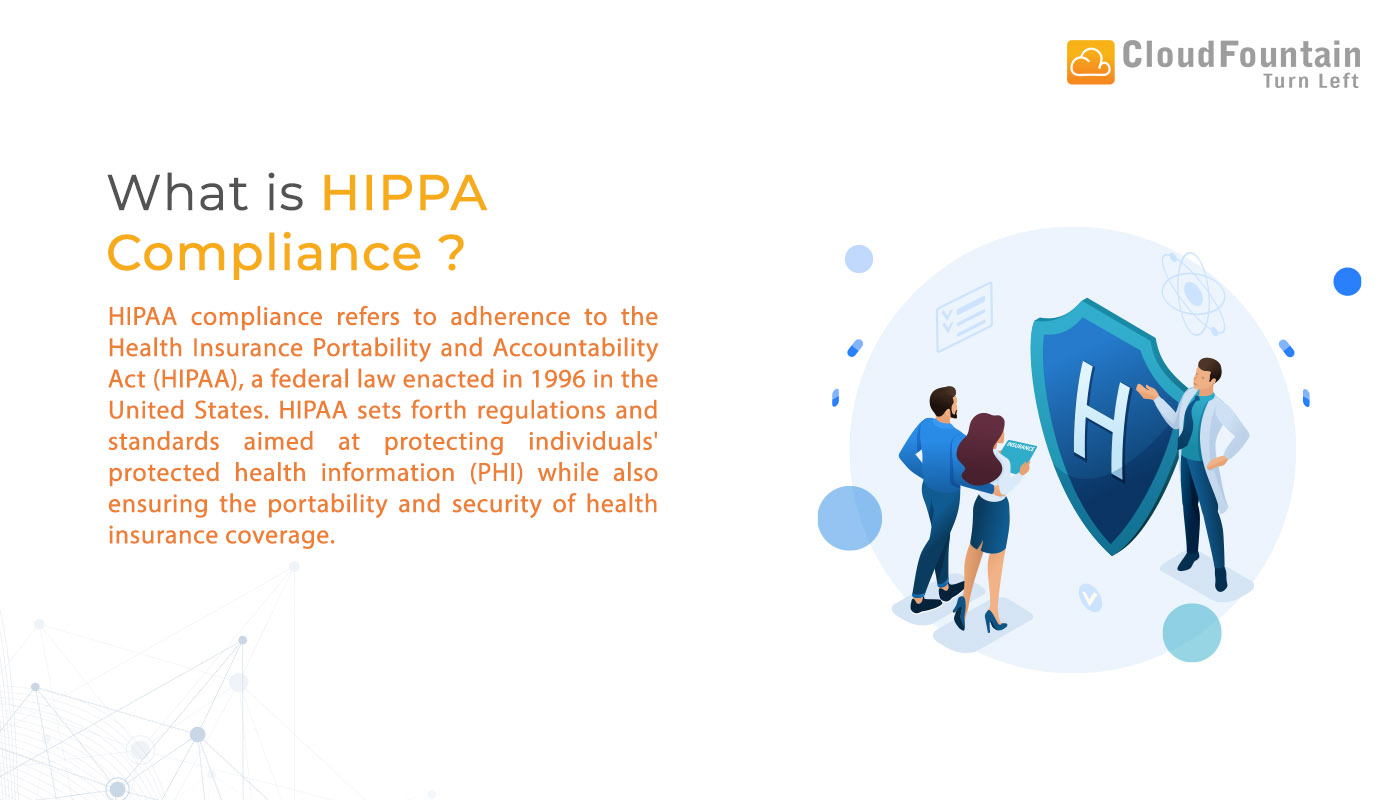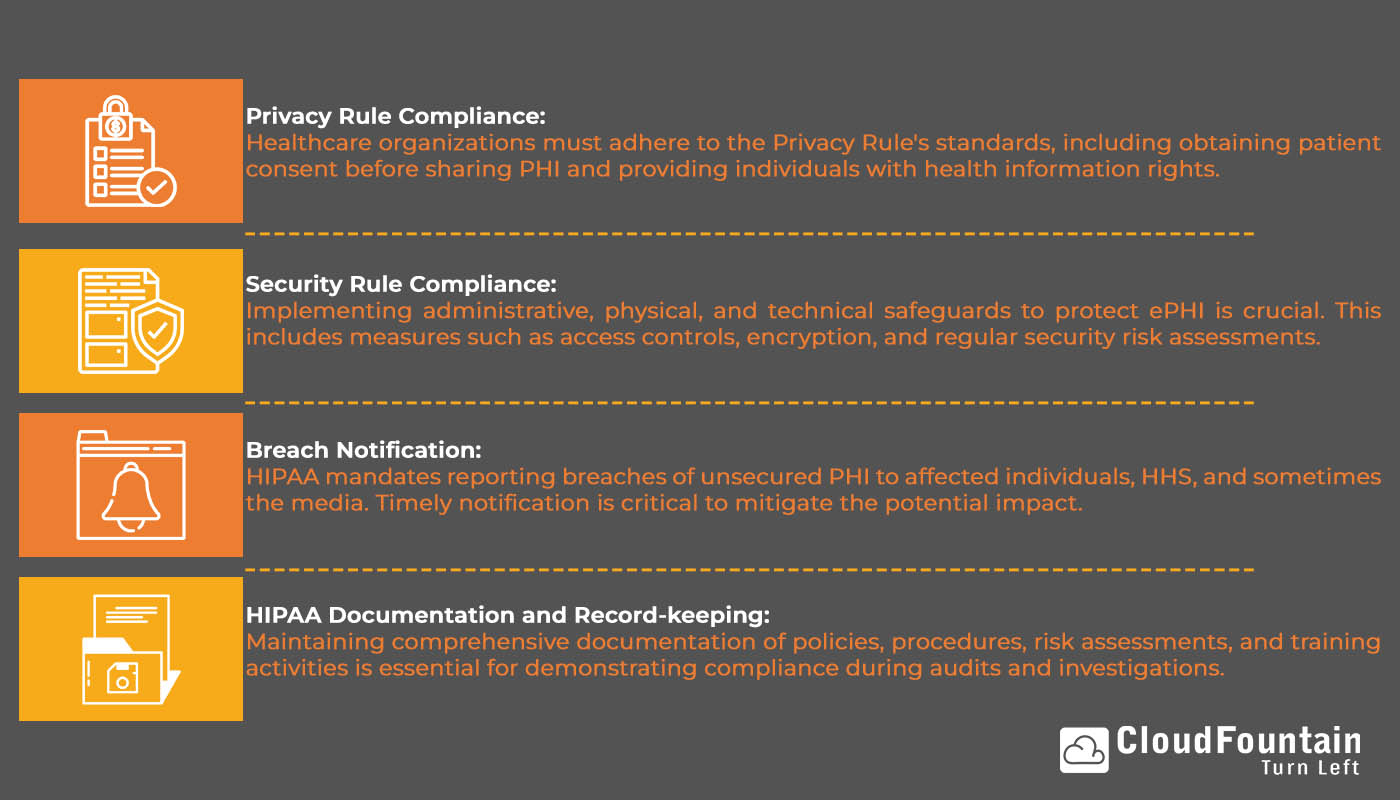In the current Digital Era patient data security is more important than ever. A cornerstone of privacy and security laws in the healthcare sector, the Health Insurance Portability and Accountability Act (HIPAA) seeks to shield patients’ private information from unauthorized access and disclosure.
For healthcare providers and organizations, understanding and adhering to HIPAA compliance requirements are paramount. Let’s delve into the world of HIPAA compliance, exploring best practices and essential requirements to ensure the protection of patient privacy and data security.
Understanding HIPAA Compliance

HIPAA, the Health Insurance Portability and Accountability Act, enacted in 1996, is a critical legislation ensuring the privacy and security of individuals’ health information in the United States healthcare system.
Essential HIPAA Compliance Requirements

Compliance with HIPAA regulations is imperative for healthcare organizations to protect patient’s privacy and maintain the security of their health information. Essential HIPAA compliance requirements encompass adherence to the Privacy Rule, Security Rule, breach notification protocols, and thorough documentation practices.
Understanding and implementing these requirements are fundamental to ensuring patient trust and regulatory compliance in the healthcare industry:
- Privacy Rule Compliance: Healthcare organizations must adhere to the Privacy Rule’s standards regarding the use and disclosure of PHI. This includes obtaining patient consent before sharing their information and providing individuals with rights regarding their health information.
- Security Rule Compliance: Implementing administrative, physical, and technical safeguards to protect the confidentiality, integrity, and availability of ePHI is essential for Security Rule compliance. This includes measures such as access controls, encryption, and regular security risk assessments.
- Breach Notification: HIPAA mandates that covered entities and their business associates report breaches of unsecured PHI to affected individuals, the Department of Health and Human Services (HHS), and, in some cases, the media. Timely notification is critical to mitigate the potential impact of a breach.
- HIPAA Documentation and Record-keeping: Maintaining comprehensive documentation of HIPAA policies, procedures, risk assessments, and training activities is essential for demonstrating compliance during audits and investigations.
Adherence to essential HIPAA compliance requirements is paramount for healthcare organizations to safeguard patients’ protected health information (PHI) and maintain regulatory compliance. Ensuring compliance with essential HIPAA requirements isn’t just a task – it’s a journey. CloudFountain is here to guide you every step of the way with our HIPAA Compliance, Governance and Risk Management Services.
HIPAA compliance is complex. Choosing an experienced partner is not just a wise decision – it’s essential for safeguarding patients’ protected health information (PHI) and avoiding the serious consequences of violating HIPAA regulations.
The risks of non-compliance, including civil monetary penalties, corrective action plans, criminal charges, reputational damage, legal liability, and loss of business opportunities, underscore the importance of having expert guidance and support.
By partnering with CloudFountain, organizations gain access to expertise, resources, and tailored solutions to navigate the complexities of HIPAA compliance effectively. With dedicated support and strategic guidance, organizations can mitigate risks, ensure regulatory compliance, and protect patients’ privacy and security, ultimately safeguarding their reputation and long-term success.
Trust CloudFountain to lead you from compliance confusion to confident compliance mastery, where every milestone becomes a triumph and every challenge an opportunity for growth.
Best Practices for HIPAA Compliance
Maintaining compliance with the Health Insurance Portability and Accountability Act (HIPAA) is paramount for healthcare organizations entrusted with sensitive patient information.
Best practices for HIPAA compliance encompass a range of strategies aimed at safeguarding protected health information (PHI) and electronic protected health information (ePHI) from unauthorized access and disclosure.
From comprehensive employee training to robust breach response plans, these practices form the foundation of a secure and compliant healthcare environment:
- Employee Training and Awareness: Comprehensive training programs should be implemented to educate staff about HIPAA regulations, emphasising the importance of safeguarding PHI and ePHI. Regular training sessions and updates ensure that employees remain vigilant and knowledgeable about compliance requirements.
- Risk Assessment and Management: Conducting regular risk assessments helps identify potential vulnerabilities in systems, processes, and policies. organizations should develop strategies to mitigate identified risks and continually monitor and update security measures.
- Secure Data Storage and Transmission: Implementing robust encryption methods for data storage and transmission adds an extra layer of security, protecting patient information from unauthorized access or interception. Utilizing secure channels and encrypted communication platforms ensures the confidentiality and integrity of ePHI.
- Access Control and Authentication: Limiting access to PHI based on the principle of least privilege reduces the risk of unauthorized Implementing strong authentication protocols such as multi-factor authentication (MFA) ensures that only authorised personnel can access sensitive information.
- Breach Response Plan: Despite robust preventive measures, data breaches can still occur. Having a comprehensive breach response plan in place enables organizations to respond promptly and effectively in the event of a security incident. This includes notifying affected individuals, regulatory bodies, and implementing measures to mitigate further damage.
- Business Associate Agreements (BAAs): Working with third-party vendors or business associates requires the establishment of BAAs to ensure that they adhere to HIPAA regulations. These agreements outline the responsibilities of the business associate concerning the protection of PHI and ePHI.
- Regular Audits and Compliance Monitoring: Conducting regular audits and assessments of internal processes and systems helps ensure ongoing compliance with HIPAA regulations. Monitoring changes in regulations and industry best practices allows organizations to adapt their compliance strategies accordingly.
By prioritising employee training, risk assessment, secure data storage, access control, breach response planning, business associate agreements, and regular audits, organizations can mitigate the risk of data breaches and ensure ongoing compliance with HIPAA regulations.
Embracing these practices not only protects patient information but also fosters trust and confidence among stakeholders, reinforcing the commitment to maintaining the highest standards of healthcare data security and privacy.
Final Thought
In conclusion, achieving and maintaining HIPAA compliance requires a concerted effort from healthcare organizations, supported by robust policies, procedures, and technological safeguards.
By prioritising patient privacy and data security, healthcare providers can fulfill their ethical and legal obligations while building trust with patients and stakeholders. Embracing best practices and staying abreast of evolving regulatory requirements are key to navigating the complex landscape of HIPAA compliance in healthcare. Choosing an Experienced HIPAA Consulting Partner like CloudFountain opens up access to resources and tailored solutions. By adhering to these principles, healthcare organizations can ensure the protection of patient information while fulfilling their mission of delivering quality care.
Related: What is SOC 2 Compliance For Your Business and How To Achieve It?

